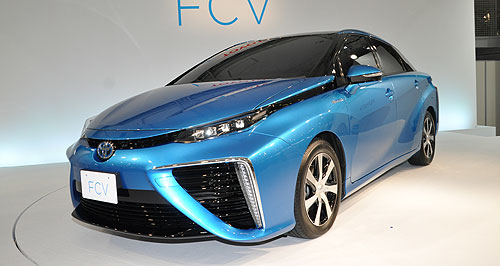Make / Model Search
Future models - Toyota - FCVFirst look: Toyota shows fuel-cell car for the roadHard cell: Toyota’s unnamed hydrogen fuel cell production car has been revealed in the flesh, less than a year ahead of its 2015 launch in Japan, the US and Europe. Toyota set to take the hydrogen route with fuel-cell sedan – but no time soon on OzGallery Click to see larger images 25 Jun 2014 TOYOTA has unwrapped the production version of its first mass-produced hydrogen fuel-cell electric car, revealing an exterior design close to that of the FCV concept shown at last year’s Tokyo motor show. The distinctively styled sedan – which Toyota hopes will do for hydrogen power what Prius did for hybrids – is earmarked for sale in Japan next April, with the United States and Europe to follow a few months later. However, Australians should not hold their breath for an early arrival of what could be described as the world’s most advanced car, as a lack of hydrogen-supply infrastructure is likely to deter Toyota Australia from chancing its hand with a local launch in the immediate future. Toyota Australia executive director sales and marketing Tony Cramb said Toyota's history with hybrid vehicles provided the experience needed to launch a new technology to the market in countries “where the fuelling infrastructure is available”. "In Australia, there are many challenges ahead, including development of the required infrastructure and greater customer awareness, before hydrogen fuel-cell vehicles can be offered here,” he said. "But Toyota is confident that hydrogen will become increasingly popular as a way of powering vehicles around the world."The car will be sold for about ¥7 million ($A73,300) in Japan – well below the ¥10 million ($107,000) predicted at the Tokyo motor show in November. Images released in Japan today reveal the same body shape as the FCV, with minor changes such as more conventional external rear vision mirrors instead of the integrated variants on the show car, a slightly different grille and headlight treatments. Toyota has pointedly not named the new vehicle in its media release, leaving car fans guessing at the nameplate for the car that uses fuel cells to turn hydrogen into electricity, emitting only water vapour from its tailpipe. Final specifications are also still under wraps, but the FCV prototype generated 100kW of power from its electric motor supplied with electricity from a light-weight fuel-cell stack drawing hydrogen from two 70Mpa hydrogen fuel tanks. Toyota said hydrogen was “a particularly promising alternative fuel”, with a higher energy density than batteries when compressed. The launch of the fuel-cell car will be the realisation of a dream for many within Toyota, which has been developing fuel-cell vehicles in-house for more than 20 years. Like some other car companies, such as Honda with its Clarity, Toyota has dipped its toe in the fuel-cell water previously, leasing a limited number of cars – called FCHV – in Japan and the US in 2002 to test the technology in real-world conditions. In the US, Hyundai recently launched its ix35 Fuel Cell – called Tucson Fuel Cell there – as a lease vehicle in Southern California, where the state government is planning 50 hydrogen refuelling stations to encourage such vehicles. Right now, Australia has no public hydrogen refuelling stations.  Read moreAll future models Alfa Romeo Alfa Romeo Abarth Abarth Alpine Alpine Alpina Alpina Audi Audi Aston Martin Aston Martin BMW BMW Bentley Bentley Chery Chery Brabham Brabham Chrysler Chrysler Chevrolet Chevrolet Cupra Cupra Citroen Citroen DS DS Dodge Dodge Fiat Fiat Ferrari Ferrari Foton Foton Ford Ford Great Wall Great Wall FPV FPV Haval Haval GWM GWM Honda Honda Holden Holden Hummer Hummer HSV HSV Infiniti Infiniti Hyundai Hyundai Jaguar Jaguar Isuzu Isuzu Kia Kia Jeep Jeep Land Rover Land Rover Lamborghini Lamborghini Lexus Lexus LDV LDV Mahindra Mahindra Lotus Lotus Mazda Mazda Maserati Maserati Mercedes-AMG Mercedes-AMG McLaren McLaren MG MG Mercedes-Benz Mercedes-Benz Mitsubishi Mitsubishi Mini Mini Opel Opel Nissan Nissan Peugeot Peugeot Pagani Pagani Proton Proton Porsche Porsche Renault Renault Ram Ram Rover Rover Rolls-Royce Rolls-Royce Skoda Skoda Saab Saab SsangYong SsangYong Smart Smart Suzuki Suzuki Subaru Subaru Toyota Toyota Tesla Tesla Volvo VolvoMotor industry news |
Click to shareToyota modelsResearch Toyota All future models Alfa Romeo Alfa Romeo Abarth Abarth Alpine Alpine Alpina Alpina Audi Audi Aston Martin Aston Martin BMW BMW Bentley Bentley Chery Chery Brabham Brabham Chrysler Chrysler Chevrolet Chevrolet Cupra Cupra Citroen Citroen DS DS Dodge Dodge Fiat Fiat Ferrari Ferrari Foton Foton Ford Ford Great Wall Great Wall FPV FPV Haval Haval GWM GWM Honda Honda Holden Holden Hummer Hummer HSV HSV Infiniti Infiniti Hyundai Hyundai Jaguar Jaguar Isuzu Isuzu Kia Kia Jeep Jeep Land Rover Land Rover Lamborghini Lamborghini Lexus Lexus LDV LDV Mahindra Mahindra Lotus Lotus Mazda Mazda Maserati Maserati Mercedes-AMG Mercedes-AMG McLaren McLaren MG MG Mercedes-Benz Mercedes-Benz Mitsubishi Mitsubishi Mini Mini Opel Opel Nissan Nissan Peugeot Peugeot Pagani Pagani Proton Proton Porsche Porsche Renault Renault Ram Ram Rover Rover Rolls-Royce Rolls-Royce Skoda Skoda Saab Saab SsangYong SsangYong Smart Smart Suzuki Suzuki Subaru Subaru Toyota Toyota Tesla Tesla Volvo VolvoMotor industry news |

















Facebook Twitter Instagram